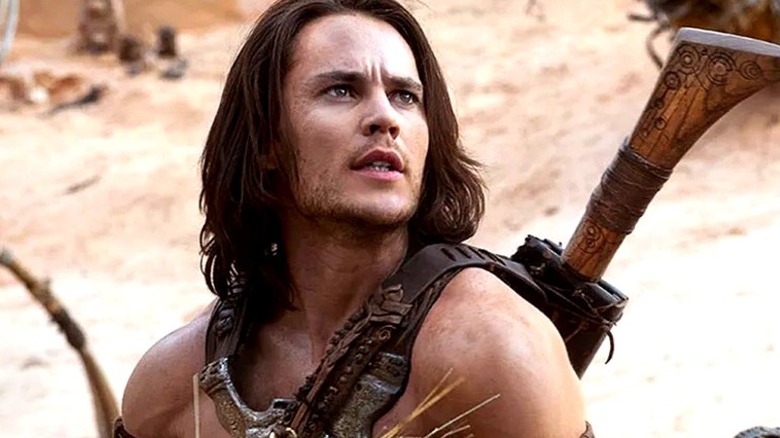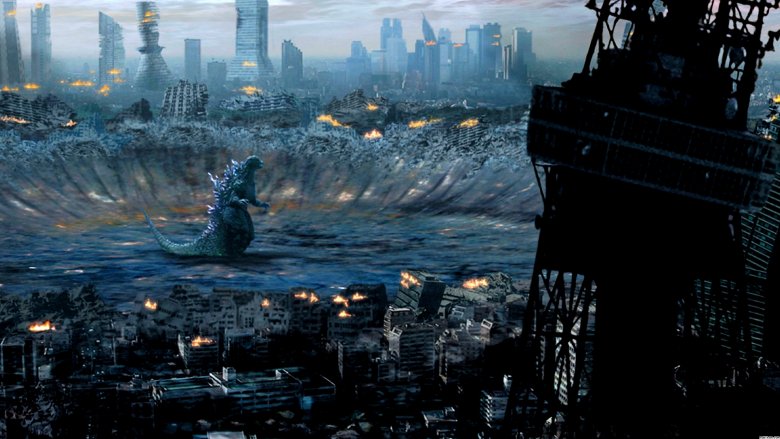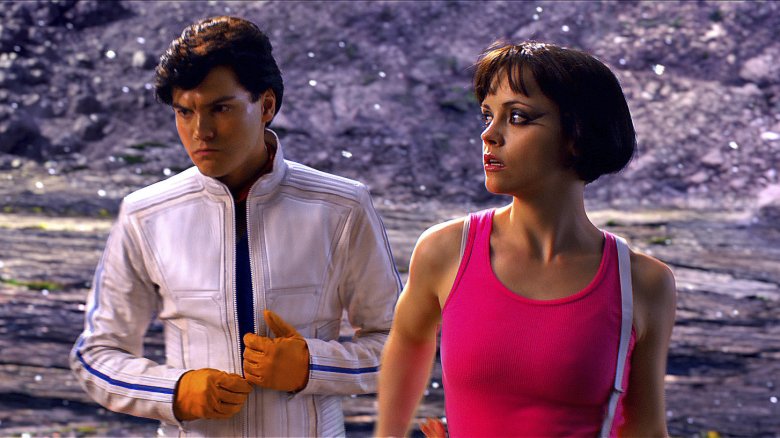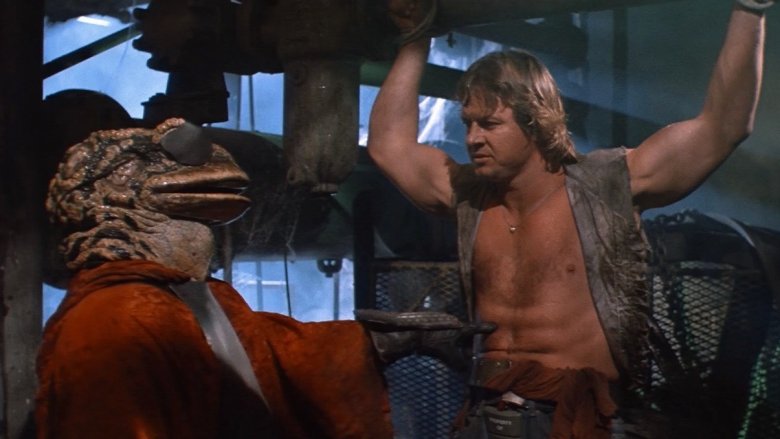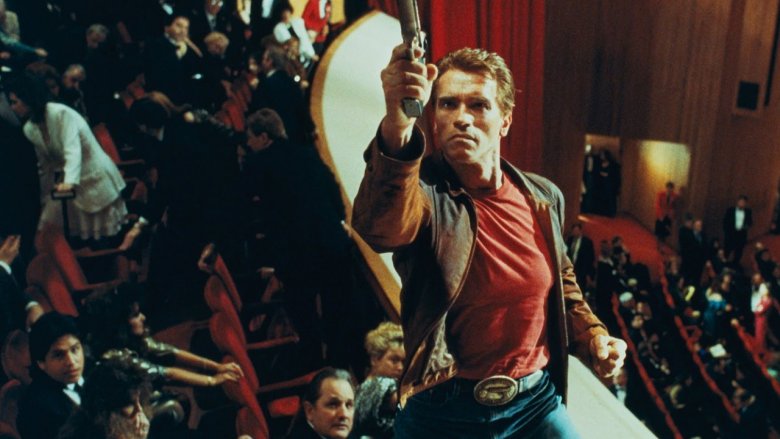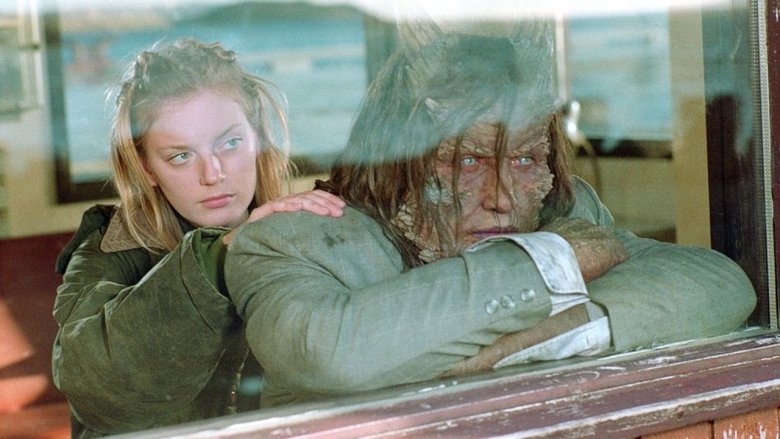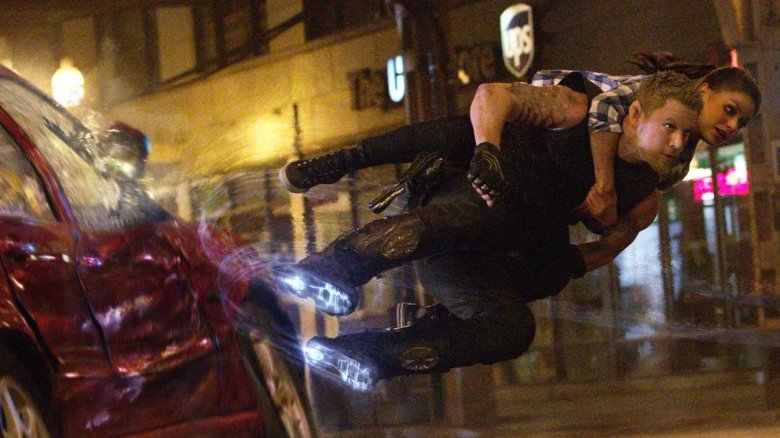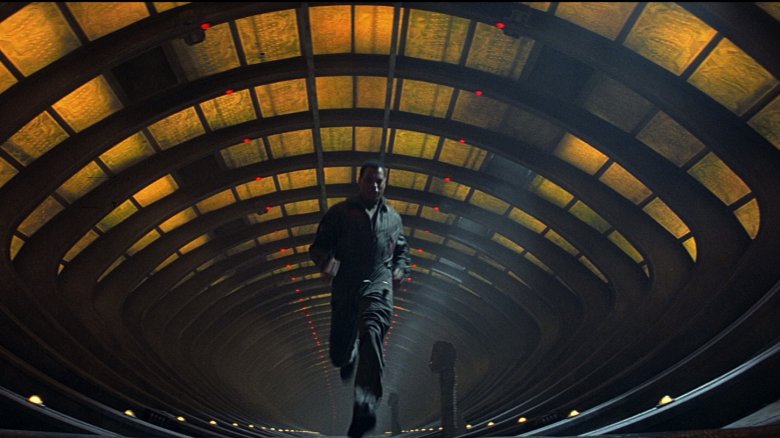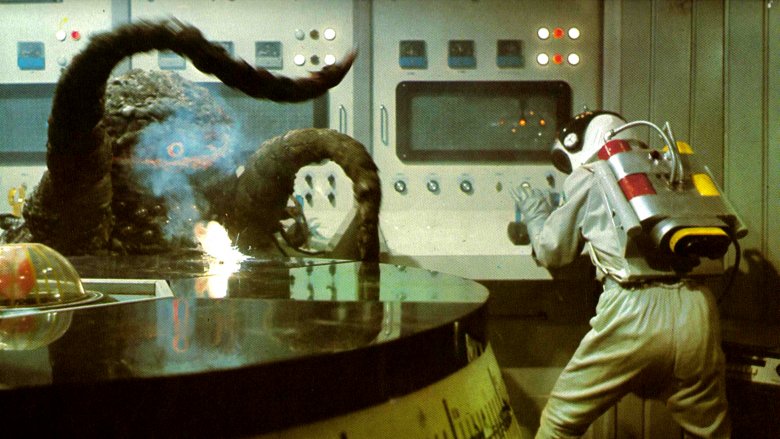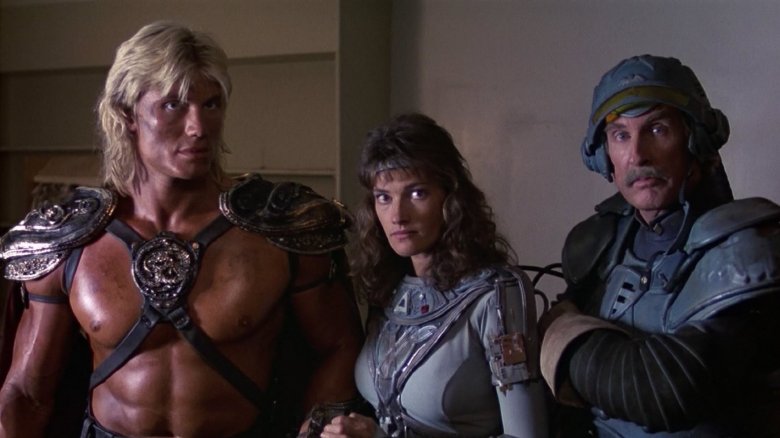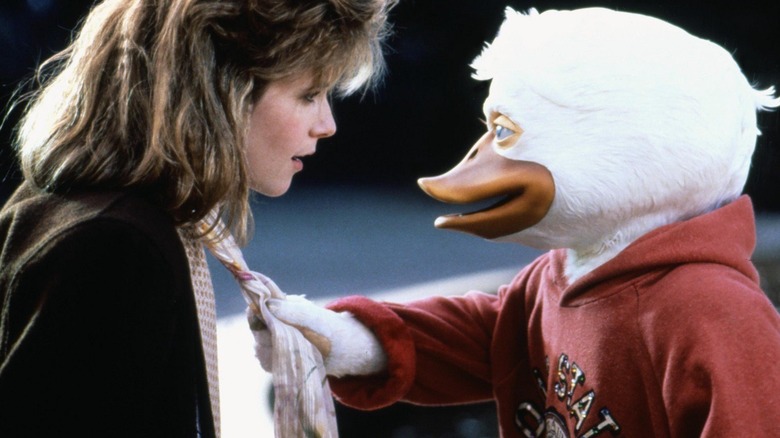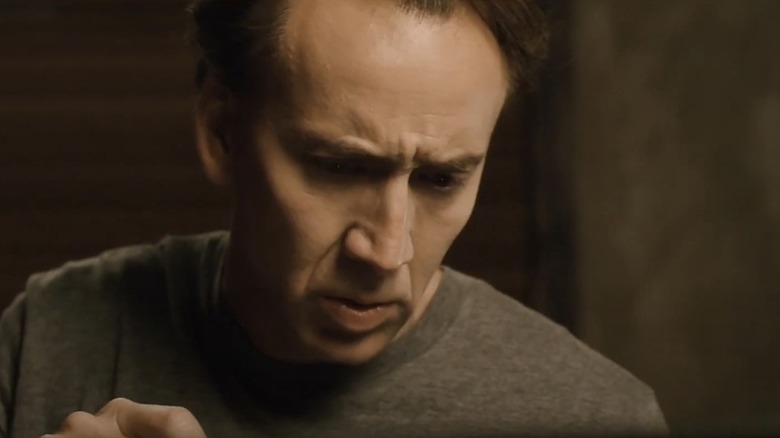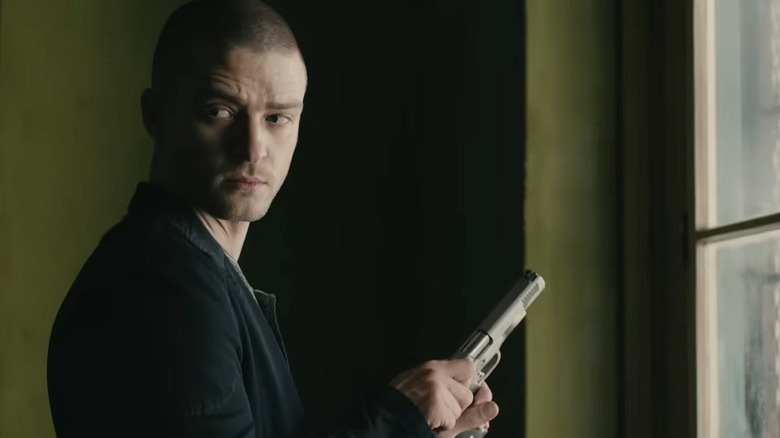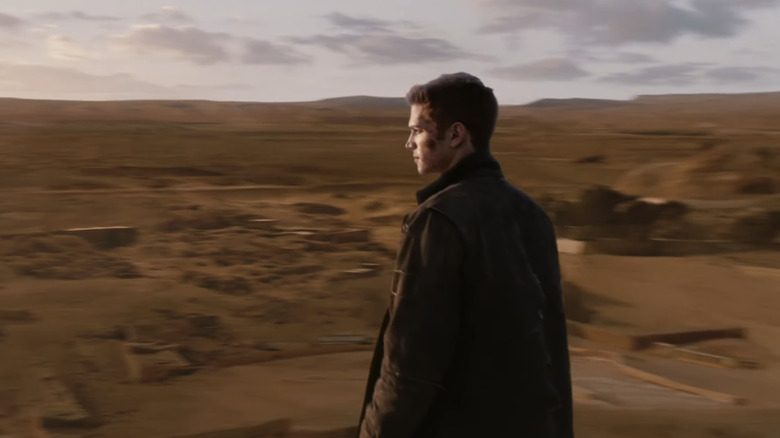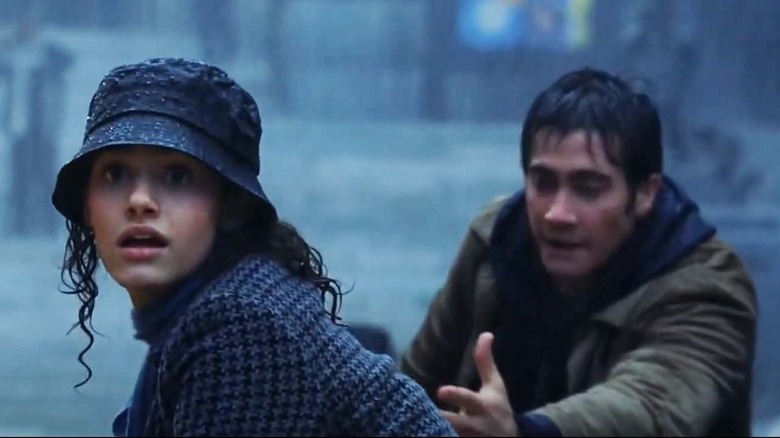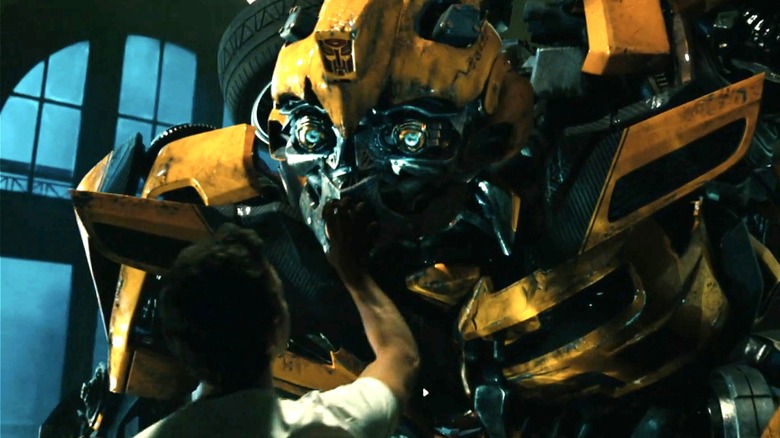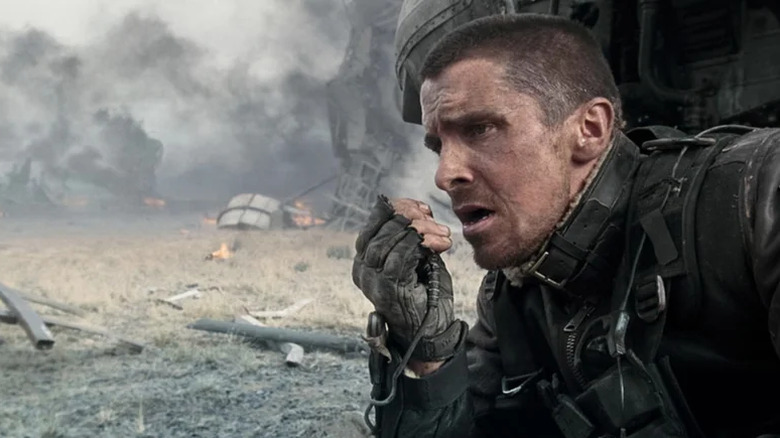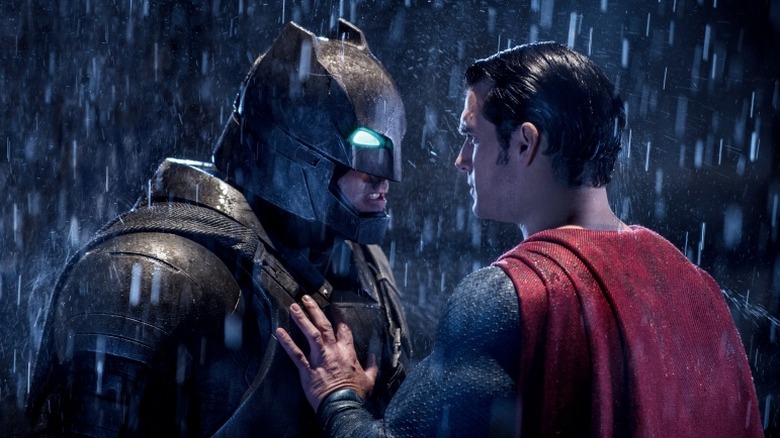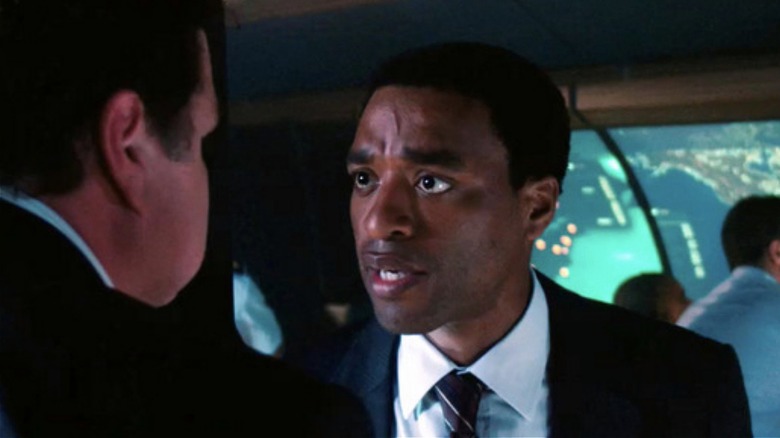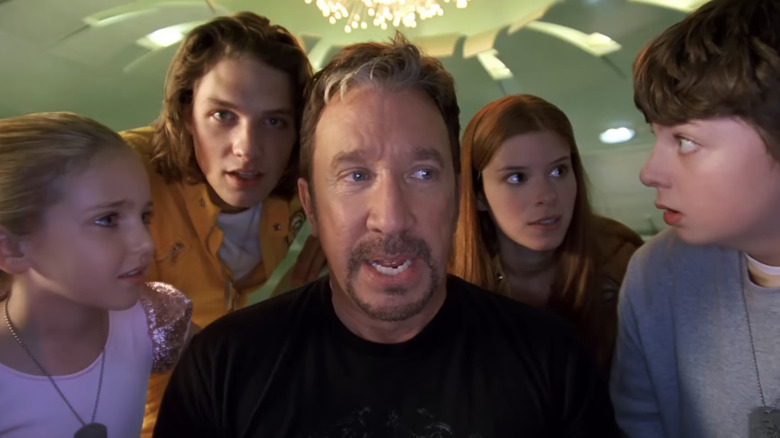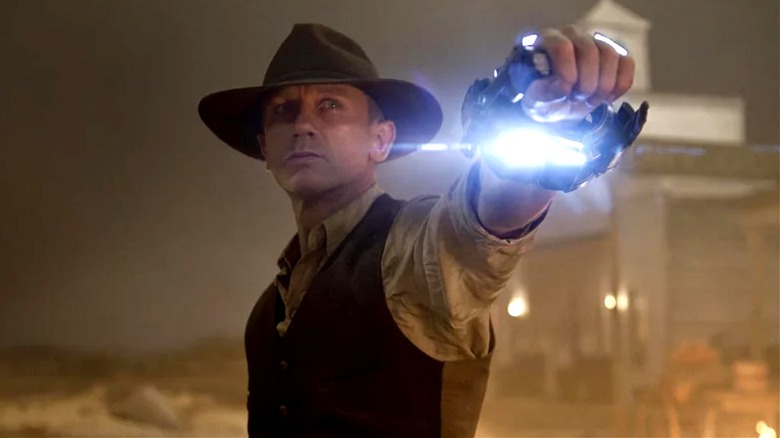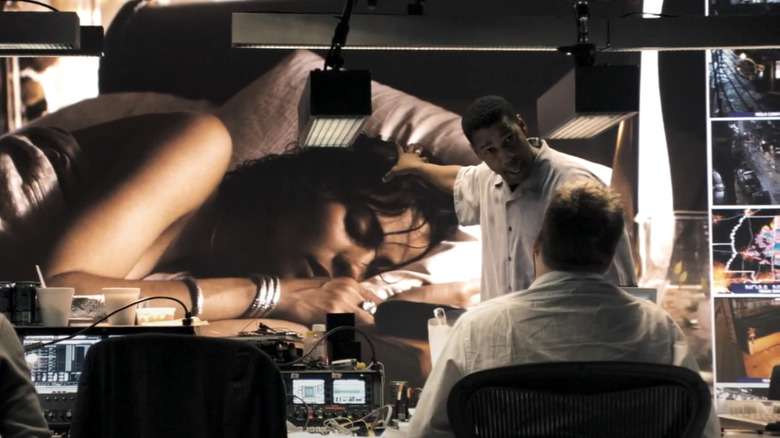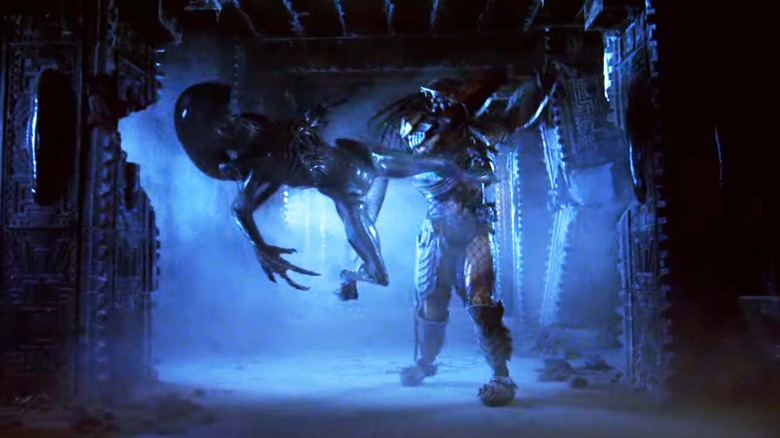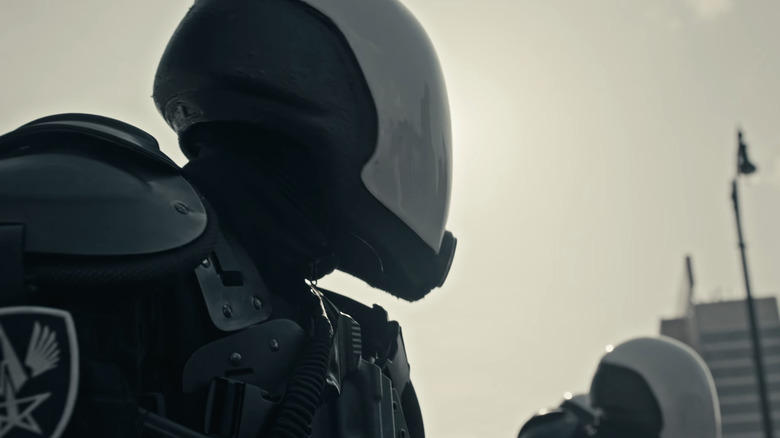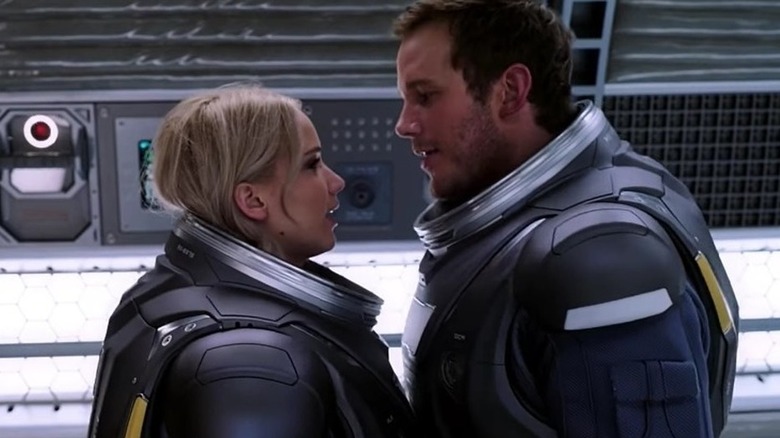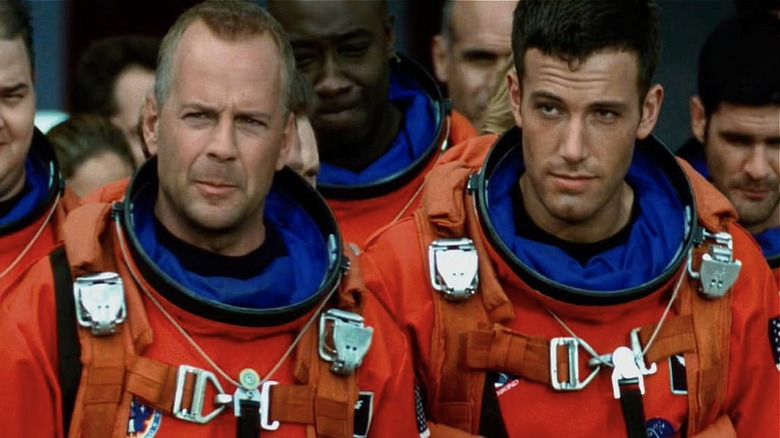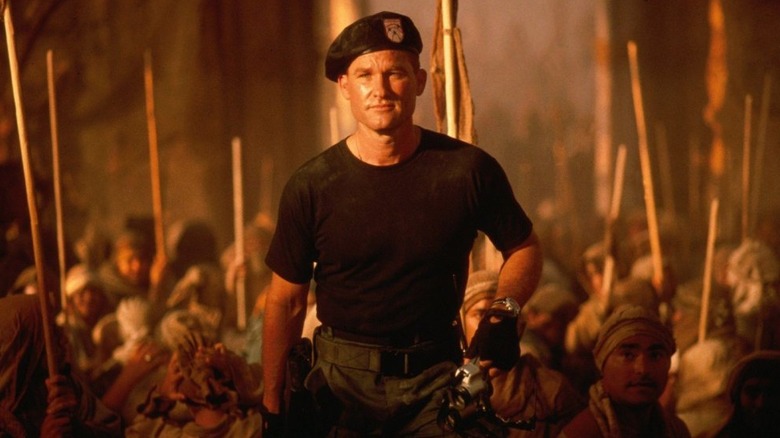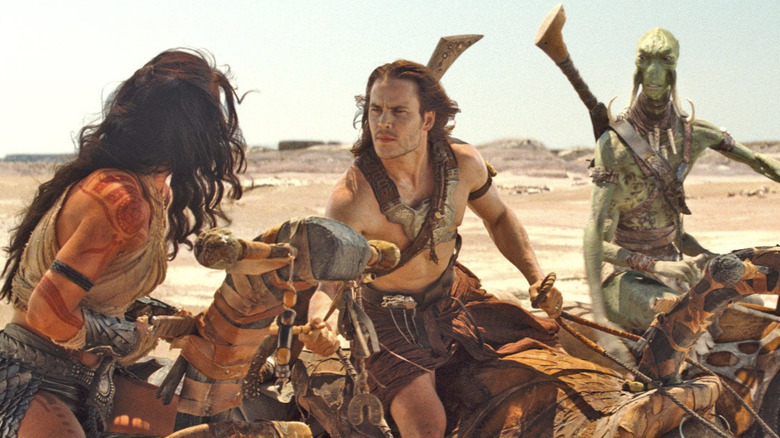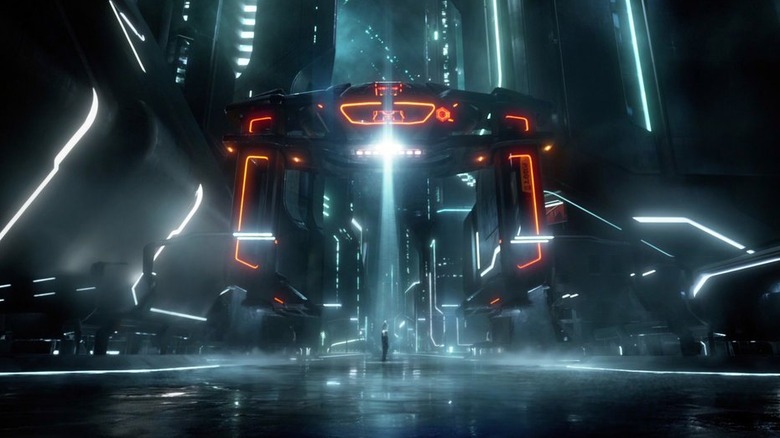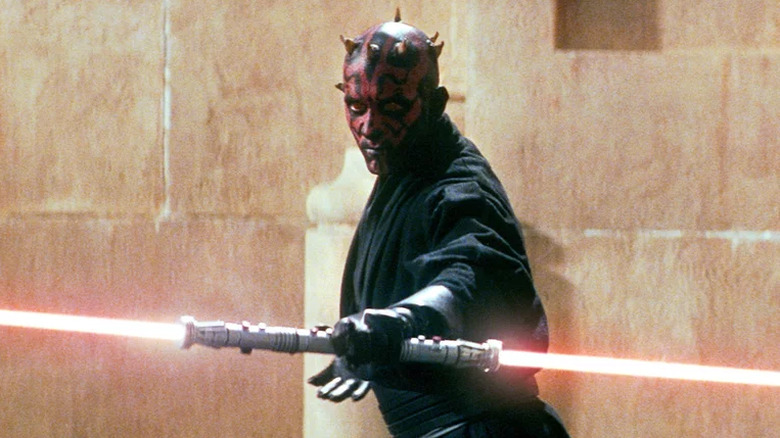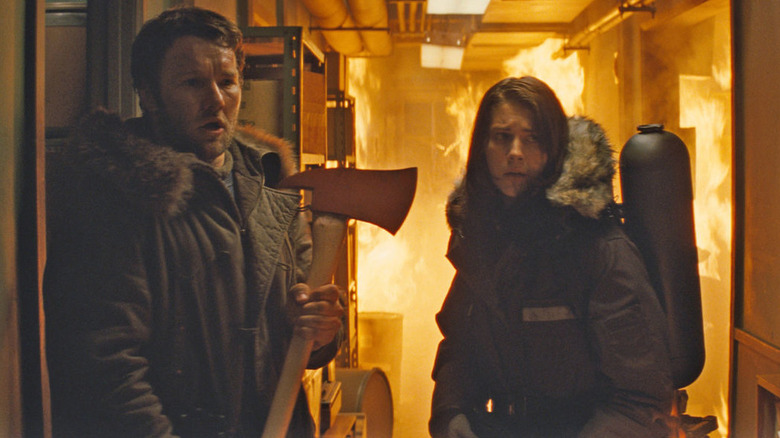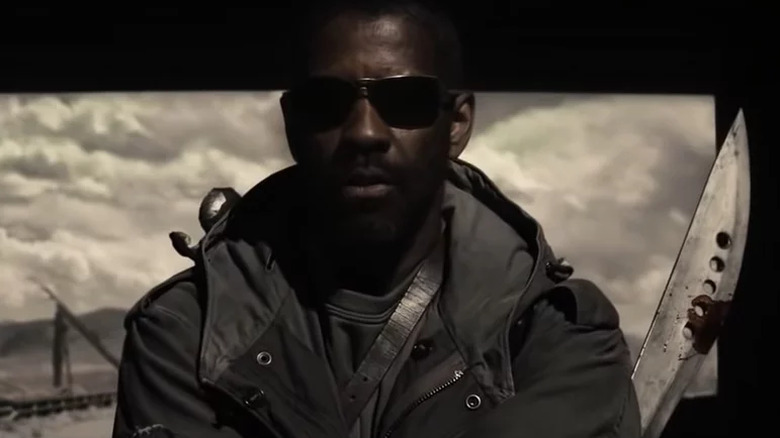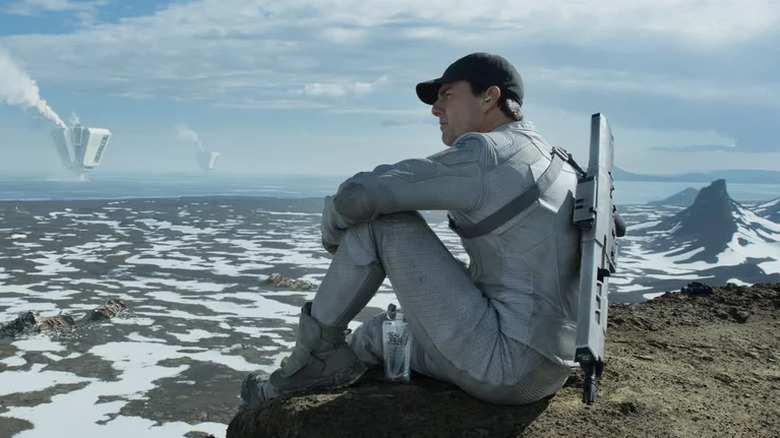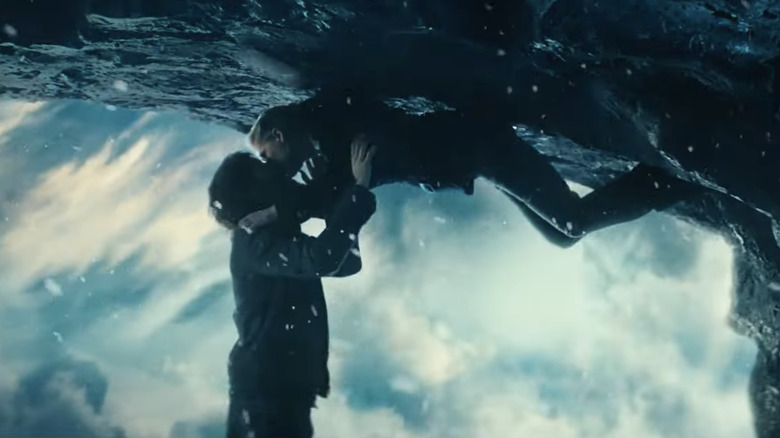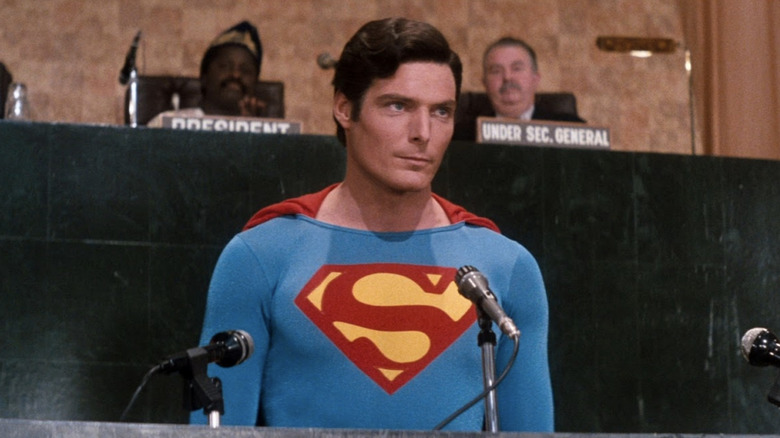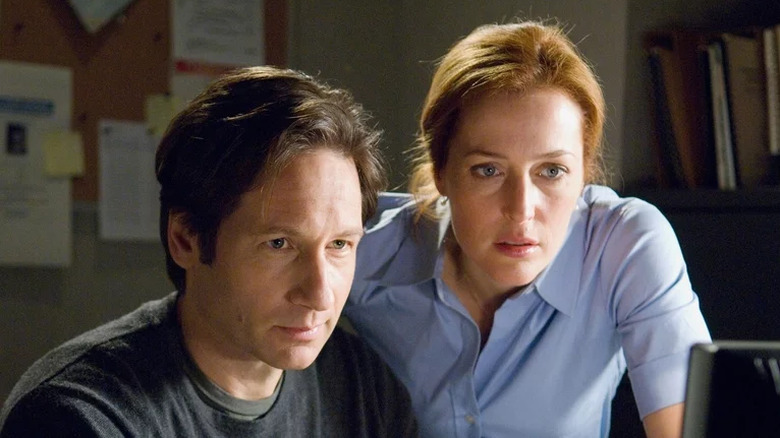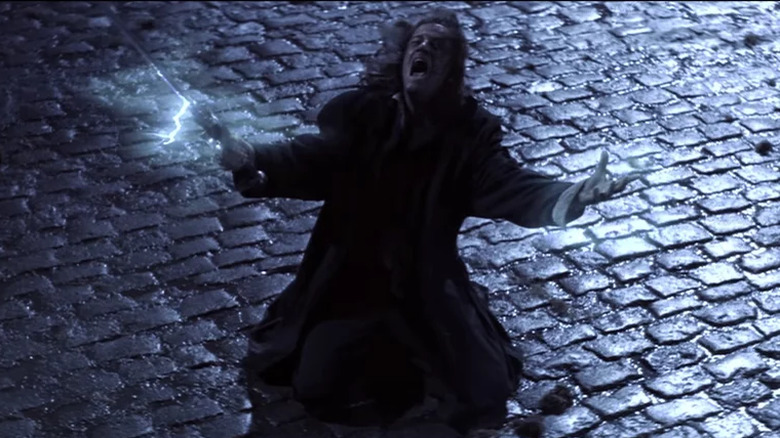Sci-Fi Films With Terrible Rotten Tomatoes Scores That You Should Watch Anyway
The science fiction genre can include space opera epics with alien worlds and galaxy-saving quests, feature more grounded themes about futuristic advancements in technology, or explore the advent of superheroes. The possibilities are endless, and it's because of this that the genre has spawned an untold number of stories in the past few centuries. While there are various mediums through which to consume science fiction, perhaps the most accessible these days is through film. Unfortunately, not every sci-fi movie is created equal.
Rotten Tomatoes aggregates movie reviews and uses them to give every film a percentage rating indicating their agreed-upon quality. While there is sometimes a clear difference between critic reviews and audience scores, when we refer to an RT score, we're talking specifically about what the critics had to say. However, just because something has a low critical rating doesn't mean you shouldn't watch it...
With this in mind, we've compiled a list of sci-fi movies that are rated quite low (anything below 60% is fair game) on Rotten Tomatoes but are still worth watching. Some of these are actually good and simply misunderstood, while others are admittedly bad but still intriguing enough to enjoy. Either way, don't let the critics dissuade you from giving these sci-fi flicks another look.
Godzilla: Final Wars
"Godzilla: Final Wars" is like Godzilla's greatest hits album. It's all the stuff you loved from the classic movies, crammed into one gonzo story. Admittedly, the plot is too inconsequential to be worth recounting here, but the short version is that some aliens are attacking Earth, and they use Kaiju (giant monsters) as weapons. To save the world, Godzilla must do battle with the Kaiju from previous movies, including Gigan, Ghidorah, Rodan, Hedorah, and a ton more.
Mothra also gets involved, as does Godzilla's son Minilla. Godzilla even fights — and easily defeats — the inferior American version of Godzilla from Roland Emmerich's 1998 movie. No one would deny that the writing of "Final Wars" is convoluted and messy, and this certainly isn't the sort of movie you watch to see people act, so its 40% rating isn't that surprising. But if you're a Godzilla fan, or you just like giant monster fights in general, this 2004 movie will give you everything you want from it and then some.
Speed Racer
You've probably heard plenty of defenses of "Speed Racer" by now. A bomb upon its 2008 release with a Rotten Tomatoes score of 40%, it's since become a beloved cult classic. Based on the American adaptation of a Japanese anime, the movie rejected realism (as directors Lilly and Lana Wachowski so often do) in favor of oversaturated futuristic visuals and characters with looks and names right out of the cartoon.
But to the surprise of many, there's no parody or cynicism in "Speed Racer." The characters are played as real people with emotions and believable motivations, and Speed Racer (Emile Hirsch) in particular is a very sincere young man who just wants to be the best at the only thing he's good at, which is driving tricked-out racecars. Even the unforgettable line "Inspector Detector suspected foul play," is delivered with a straight face. The racing scenes in particular are a delightful mix of speed, color, and editing. "Speed Racer" isn't just a weird movie worth watching, it's a genuinely great film that the public just failed to appreciate on its release.
Hell Comes to Frogtown
On the other hand, "Hell Comes to Frogtown" seems considerably overrated at 50%, which is almost certainly attributable to the small number of reviews it received. There's no world in which this should be considered a good movie, but as bad movies go, it's pretty interesting.
To start with, it stars Roddy Piper, who was best known as a professional wrestler but also starred in a legitimate sci-fi classic, "They Live." "Hell Comes to Frogtown" came out in 1988, the same year as "They Live," but it's more like a low-rent "Road Warrior" with added mutant frogs. In a post-apocalyptic future where most humans are sterile, Piper plays Sam Hell, a wanderer who has left a trail of pregnant women in his wake. He's captured by a group of militant nurses who want him to impregnate the fertile women under their care, except that those women have been captured by reptilian mutants and taken to their settlement. So it falls to Hell to go to Frogtown and find the captured women.
The script is a joke and the gender politics are terrible, but Piper is always a magnetic presence on screen, and the frogs have some great gross looks, even if their mouths never quite move as well as you want them to. So if you enjoy '80s schlock, or you're just a big Rowdy Roddy Piper fan, definitely give "Hell Comes to Frogtown" a look.
Last Action Hero
Arnold Schwarzenegger was a megastar in 1993, and "Last Action Hero," directed by action master John McTiernan, was intended to be a huge summer blockbuster, but it became a legendary flop. Critics hated it, resulting in its 34% Rotten Tomatoes score, and audiences just didn't have time for it, since it opened the week after "Jurassic Park," which wasn't letting go of the No. 1 slot at the box office.
What's interesting about "Last Action Hero" is also what ultimately makes it a failure: it's a parody of over-the-top action films that allows itself to become an over-the-top action film. It satirizes overused tropes and then turns around and uses them with barely a wink. Schwarzenegger plays Jack Slater, the hero of a series of action films who finds his way into the real world, but he also turns up as himself in the "real world" scenes.
The best part of the movie is probably Charles Dance, best known today as Tywin Lannister on "Game of Thrones." Dance plays the main villain, a hitman from Slater's world who realizes he can eliminate his nemesis by killing Schwarzenegger. Ian McKellen, years before he was a Hollywood star, plays Death, who steps out of an Ingmar Bergman movie to play a key role in the finale. "Last Action Hero" doesn't quite hold together, but it's still entertaining, and some excellent performances along with the grand scale of what it's trying to do narratively make it an interesting watch.
No Such Thing
An art film that disguised itself as a fantasy-horror film, 2001's "No Such Thing" disappointed everyone who watched it looking for something it's not. Sarah Polley plays Beatrice, a young journalist who travels to Iceland looking for a legendary monster that may be responsible for the death of her boyfriend. What she finds is an ancient and intelligent creature, played by Robert John Burke, who has lived longer than the human race has existed, and wants nothing more than to die.
Beatrice's discovery of the monster makes them both celebrities, and they end up in New York City. But the monster is more miserable than ever, drinking and brooding and looking for an end to his existence. Eventually Beatrice helps him find the death he's after, as they're pursued by a paranoid government. Despite its 29% RT rating, "No Such Thing" is a beautiful and contemplative film. It's just not the sort of thing you except when one of the main characters is a monster with huge horns.
Jupiter Ascending
"Jupiter Ascending" is the second film from the Wachowskis on this list, and it won't be at all surprising if it becomes as much of a cult classic as "Speed Racer," once a little more time has passed. The major flaw of "Jupiter Ascending" is that it tries to do too much. It's basically an epic sweeping space opera trilogy in the form of one two-hour movie.
Mila Kunis stars as Jupiter Jones, a poor girl from Earth who finds out she's next in line for a vast inheritance from outer space. Channing Tatum plays a wolf man from space who's assigned to protect her from the many forces aligned against her. Chief among those forces is Eddie Redmayne, who plays an evil alien who's human in appearance but unmistakably reptilian in demeanor. The movie is an overstuffed roller coaster filled with aliens, animal people, space ships, bounty hunters, treacherous marriage plots, and one whole planet of tedious bureaucrats.
There are certainly valid criticisms about this 2015 movie: the plot is definitely convoluted, and some of the dialogue isn't great. But a lot of the critics that contributed to the film's 26% score on Rotten Tomatoes seem to have a problem with the basics of the space opera subgenre, finding concerns about believability in a story about a galaxy-spanning space dynasty and resenting the amount of money spent on something they viewed as silly. "Jupiter Ascending" may not be a perfect movie, but time will almost certainly be kind to it.
Event Horizon
Despite being rated at 26% at Rotten Tomatoes, 1997's "Event Horizon" might be the most frightening outer space horror film that doesn't involve facehuggers or xenomorphs. In fact, there are no aliens in this movie at all, unless you count an unseen and shapeless evil. The Event Horizon, a ship equipped with a new kind of inter-dimensional warp drive, disappears on its test flight seven years earlier. Now it has reappeared near Neptune, and another ship is sent to investigate.
What they find is a ghost ship that seems to have recently returned from Hell itself. One by one, the crew encounters manifestations of their dreams and nightmares, and most of them don't survive. "Event Horizon" stars Laurence Fishburne as the captain of the rescue ship, and Sam Neill as the scientist who built the Event Horizon's gravity drive, and whose wife died on that ship. This is a grisly and disturbing movie that's definitely not for everyone. But if you like horror, the "haunted house in space" premise is interesting, and the scares are definitely there.
The Green Slime
Released in 1968, "The Green Slime" is the oldest movie on this list by a wide margin, so it almost feels rude to point out its 22% Rotten Tomatoes rating. And while it's certainly a bad film, it's one of those films that's bad in a fun, entertaining way.
It's a Japanese-American co-production, shot in Japan with a Japanese crew and an all-white cast. It feels a lot like 1960s Japanese sci-fi of the "Godzilla" variety, but it's filmed in English and has a strong inflection of "Star Trek"-era American sci-fi as well. Plus, the monsters that grow from the eponymous slime to terrorize a space station are wonderfully cheesy one-eyed tentacled beasts that were apparently portrayed by Japanese children in rubber suits. "The Green Slime" was the subject of the original pilot episode of "Mystery Science Theatre 3000," and while that pilot has never been officially released, you can recreate it by making fun of this movie as you watch it with your friends.
Masters of the Universe
"Masters of the Universe" is a big, glorious mess. Adapted from the popular line of toys, it probably earned its 17% Rotten Tomatoes rating, but it's still pretty fun, especially if you're into that Cannon Films VHS aesthetic.
Dolph Lundgren, fresh off "Rocky IV," plays He-Man, the barbarian hero who must defeat Skeletor, played here by Frank Langella. Meg Foster plays Evil-Lyn, and a very young Courteney Cox appears as an Earth teen who gets caught up in the Eternian conflict along with her boyfriend. The 1987 film contains very little of the mythology from the "Masters of the Universe" cartoon and comics, but it tells a pretty fun action-oriented story about an eternal war in a sci-fi/fantasy world spilling into 1980s Earth.
Most of the cast is quite good, particularly Langella and Foster, and Lundgren's physical acting (not to mention his impressive body) is perfect for the character of He-Man, even if you can't always understand what he's saying. Honestly, that kind of sums up the whole movie: it doesn't always makes sense, but you want to keep looking at it.
Howard the Duck
"Howard the Duck" stands at 15% on Rotten Tomatoes, and is remembered as one of the biggest bombs of all time. Based on the Marvel comic by Steve Gerber, which was a huge hit in the 1970s, it was intended to be an animated film. However, producer George Lucas owed Universal a big summer release, so he decided to just have his special effects people build a duck suit and make the 1986 film live action.
Lea Thompson, her career red hot after "Back to the Future," came on to play Howard's human love interest Beverly. Tim Robbins plays a key supporting role, and Jeffrey Jones, best known as Ferris Bueller's principal, plays a scientist who becomes possessed by an evil space creature and transforms into the movie's villain. The Duck himself is played by the diminutive Ed Gale, with Broadway actor Chip Zien providing his voice.
The movie attempts a "Ghostbusters"-like structure, where it starts as an off-kilter comedy and then escalates into an action film that climaxes with a battle against a giant monster. Unfortunately, it lacks most of the stuff that makes "Ghostbusters" so good, like strong writing and a cast of veteran comedians. There's also a bizarre sexual element to Howard and Beverly's relationship that didn't go over well with audiences. Nevertheless, "Howard the Duck" is worth a watch just for how weird it is, and for Jones' scene-stealing performance as a man slowly transforming into an alien overlord. As with all these films, watching a truly unique failure can often be at least as much fun as watching a by-the-book success.
Knowing
Released in 2009, the Nicolas Cage-led "Knowing" is a particularly fascinating film. Directed by Alex Proyas, who previously helmed "The Crow," "Dark City," and "I, Robot," the film follows your typical Nick Cage protagonist (this time, astrophysics professor John Koestler) as he stumbles upon a code embedded in world history. This cipher consists of notable dates, disastrous death tolls, and even coordinates (then-recent disasters such as the 9/11 attacks and Hurricane Katrina both factor in), all pointing to three more yet-to-happen mass tragedies. After these final events occur, the end of the world begins — and this is where "Knowing" really gets interesting.
With a 35% rating on Rotten Tomatoes, "Knowing" gets a bad rap due to its very distinct, out-of-left-field ending — but that's the genius of it. Cage perfectly encapsulates a man on the verge of the end of human civilization, and his erratic attempts to thwart these disasters don't go unnoticed. Even famed Chicago Sun-Times critic Roger Ebert gave the film a coveted four out of four stars. "'Knowing' is among the best science-fiction films I've seen," Ebert emphasized, "frightening, suspenseful, intelligent and, when it needs to be, rather awesome."
In Time
Written, produced, and directed by "Gattaca" filmmaker Andrew Niccol, 2011's "In Time" is another highly stylized venture into the realm of science fiction. Here, Justin Timberlake and Amanda Seyfried star as Will Salas and Sylvia Weis, who both believe that the time system that makes up their society is worth dismantling. In this world, humans live based on time, which is a literal currency. As people stop aging at 25, they are forced to continue to earn more time in order to live full lives, or else time out (die). The insanely weird premise makes this film quite memorable, even if it leaves you with more questions than answers.
Holding a 36% critic score on Rotten Tomatoes, the film has been rightly criticized as being far too on the nose with the "time is money" theme, and it doesn't dig too much deeper. Despite that, Timberlake and Seyfried are quite the pair, and the supporting cast — which includes Olivia Wilde, Matt Bomer, Johnny Galecki, and Cillian Murphy — is just as strong. With "In Time," the concept is everything, so if the notion that human beings are genetically engineered to live by a literal countdown clock compels you, check this one out.
Jumper
Hot off the "Star Wars" prequels, Hayden Christensen jumped into what could have easily been a solid franchise of its own. Based on the novel of the same name by Steven Gould, 2008's "Jumper" follows David Rice (Christensen), a young man who can teleport at will. Of course, not everyone appreciates David's abilities (or the other Jumpers out there), and he is relentlessly pursued by the Paladins, a group of assassins led by Roland Cox (Samuel L. Jackson). With a 15% rating on Rotten Tomatoes, one might think that "Jumper" is a complete misfire, but the truth is that this flick has its moments.
Given that the film was directed by Doug Liman, who previously helmed "The Bourne Identity" and tackled "Edge of Tomorrow" years later, anyone curious about "Jumper" can expect thrilling action and superb editing. It's fast-paced, fun, and entertaining as hell, even if the characters aren't as fleshed out as they should be. While the film made some significant changes to the novel and doesn't quite hold up in the effects department, its energetic pace and simple plot make it a quick 90-minute watch that's worth the time.
The Day After Tomorrow
Nobody makes a disaster movie quite like Roland Emmerich. After "Independence Day," the director's next big disaster-fueled blockbuster was 2004's "The Day After Tomorrow," which proved to be another box office hit. Despite that, the film holds a 45% on Rotten Tomatoes and never quite received the acclaim it deserved. Chock full of great characters, this flick is only vaguely sci-fi, though we still count it since the study of weather itself is scientific, and a global catastrophe like this still feels pretty fictional.
With strong performances from Dennis Quaid, Jake Gyllenhaal, and Emmy Rossum, the film meditates on the question of what would happen if climate change suddenly accelerated and led to a new ice age. The perfect sort of popcorn thriller to kick back and watch when you're unsure what else to do, "The Day After Tomorrow" offers plenty of thrills, emotional arcs, and some especially groundbreaking special effects work that served as the forerunner to Emmerich's future endeavors.
Transformers: Dark of the Moon
It may not come as a surprise that many of the 'Transformers" sequels have poor Rotten Tomatoes scores, but there is one installment in particular that's still worth the watch. Though the original "Transformers" holds a 57% on Rotten Tomatoes (which is just as criminal), we're actually talking about the third installment, 2011's "Transformers: Dark of the Moon." With an underwhelming 35% critic score, the film doesn't look like much on the surface. Admittedly, it's a bit long-winded at times, but as Shia LaBeouf's franchise send-off, it feels like a fitting end to an era.
"Dark of the Moon" offers a riveting batch of special effects that shine brightest during the impressive battle sequence in Chicago, which is simply massive — especially from the perspective of Josh Duhamel and Tyrese Gibson's characters. Full of Autobot betrayal, human anguish, and plenty of giant killer robots, "Dark of the Moon" is a great popcorn flick to kill a few hours with. Plus that final confrontation between Optimus Prime (Peter Cullen) and Megatron (Hugo Weaving) is immensely satisfying.
Terminator Salvation
After James Cameron's original "The Terminator" and its sequel, "Terminator 2: Judgment Day," most of the subsequent franchise installments have been misfires. But while the other films attempted to copy the success of "T2," only "Terminator Salvation" dared to take the franchise in a bold, new direction, pivoting from the time travel schtick and moving full-force into the Future War. Although the film was released in 2009, it was set in the post-Judgment Day world of 2018, where John Connor (Christian Bale) slowly rises in the ranks of the Resistance to become the leader he was always destined to be. Sam Worthington, Moon Bloodgood, Bryce Dallas Howard, and Anton Yelchin also star.
Somehow, "Terminator Salvation" only garnered a 33% critic score on Rotten Tomatoes, which doesn't quite make sense. While not on par with the original Cameron films, this McG-directed thriller ventures headfirst into the post-apocalyptic landscape with ease, offering plenty of intense action, philosophical questions about the nature of humanity, and plenty of tie-ins to the originals to keep fans interested. No, "Salvation" isn't as grand as the first two "Terminators," but it is the sequel most worthy of carrying the franchise's name.
Batman v Superman: Dawn of Justice
No superhero movie has been more controversial in recent years than "Batman v Superman: Dawn of Justice." A follow-up to Zack Snyder's "Man of Steel" (which itself sports an unwarranted 57% "rotten" score), "Batman v Superman" united DC Comics' heaviest hitters on the big screen, pitting them against each other before they team up for the common good. Henry Cavill's Superman and Ben Affleck's Batman are both great, and while one can argue their comic book accuracy, that isn't the issue with this film. Indeed, the problem is that the theatrical cut removed critical plot details that made the story choppier than it should be, which is why the "Ultimate Edition" is the way to go.
Many of your biggest unanswered questions about "Batman v Superman" will be resolved by giving the "Ultimate Edition" a fair shake. Even if you didn't like "Dawn of Justice" the first (or second) time around, Snyder's second DC Extended Universe installment certainly doesn't deserve its egregious 29% Rotten Tomatoes score. With deeply layered and pensive character arcs, the grand scale of this early DCEU feature should have gotten comic book fans far more excited.
2012
If you thought that Roland Emmerich's "The Day After Tomorrow" was a tour de force in destruction, then wait until you see (or revisit) "2012." After years of perfecting the special effects that go into these sorts of big-budget disaster blockbusters, Emmerich returned for this 2009 epic. This time, he centers the plot on the infamous 2012 phenomenon involving the Mayan calendar, merging various conspiracy theories, religious prophecies, and scientific warnings together for a global disaster that the protagonists can only hope to escape.
With a 40% on Rotten Tomatoes, we have to admit that "2012" isn't a great film. John Cusack, Chiwetel Ejiofor, Thandiwe Newton, Amanda Peet, and Woody Harrelson do their best, to be sure, but the characters are largely flat or cliched, offering virtually no reason for the audience to become emotionally invested. So why watch "2012," then? Well, this movie thrived at the box office due to the spectacle of it all. The real reason to stick around is the impressive display of special effects prowess that looks better than most current blockbusters.
Zoom
Not every superhero movie should be remembered fondly, but we're tossing "Zoom" in here anyway. With a measly 5% critic rating on Rotten Tomatoes, this 2006 feature is arguably Tim Allen's biggest critical failure. Here, the comedian stars in a family-centric superhero romp in the same vein as something like "The Incredibles," only in live-action.
Allen plays Jack Sheppard, a former superhero who lost his powers years ago and is now forced to train up the next generation before his villainous brother returns. Clearly, the production was trying to copy Pixar's previous success.
Admittedly, "Zoom" is a lot more fun for younger audiences than it may be for adults. It's campy in the best comic book ways and leans heavily into the "family of superheroes" concept, albeit in a very Tim Allen fashion. Audiences who grew up with "Zoom" likely have fond memories watching it on home video (it didn't do well at all in theaters), with the best part being that final climactic battle performed to the tune of Superchick's "It's On," which may just be the best use of that song, ever.
Cowboys and Aliens
The melding of the science fiction and Western genres doesn't happen too often, and when it does, we get movies like "Cowboys and Aliens." Directed by "Iron Man" legend Jon Favreau, the film is actually based on a graphic novel published by Platinum Studios. Unfortunately, the comic book is better than the movie, which maintains a 44% on Rotten Tomatoes. But it's not all bad. There's a lot of fun to be had with the idea of Old West characters interacting with a hostile alien species, with fascinating world-building and enough action to ensure the audience sticks around.
Additionally, the inclusion of Daniel Craig as the film's lead outlaw, Harrison Ford as its lawman, and Olivia Wilde as the benevolent alien (not to mention the other stellar casting choices) makes "Cowboys and Aliens" a fun ride into the sunset. Don't expect the same sort of emotional depth you might from your standard horse opera fare, however, as this movie is all about the presentation, not the substance. If you can go into it with that in mind, you'll have a grand old time.
Déjà Vu
For years, Hollywood and audiences alike have undervalued the works of late director Tony Scott. While his brother, Ridley Scott, is well known for his work in science fiction, Scott's 2006 thriller "Déjà Vu" proves that Tony, too, could have made the genre his own. With an undeserved 55% on Rotten Tomatoes, "Déjà Vu" is far better than it's given credit for.
Denzel Washington stars here as ATF Agent Douglas Carlin, who gets drafted into the FBI's latest top-secret program (dubbed "Snow White") after a terrorist attack in New Orleans. Carlin quickly discovers that this surveillance program can peer back through time to days before the attack. In the process, he falls in love with Paula Patton's Claire, one of the victims of the attack.
"Deja Vu" is a pulse-pounding, edge-of-your-seat action thriller with a sci-fi twist that showcases the master vision of a director like Scott. Yes, Washington is excellent, and the editing is phenomenal, but the cohesive vision for this film is what gives it character. It's hard to believe that a movie like this could be rated so low, and if you don't believe us, you'll just have to check it out for yourself.
Alien vs. Predator
Don't worry — nobody here is claiming that "Alien vs. Predator" is actually a good movie. Helmed by Paul W. S. Anderson, "AVP" earned its low 21% on Rotten Tomatoes all by itself. With a muddled plot, loose continuity ties to both the "Alien" and "Predator" franchises, and virtually nothing compelling about it, this 2004 sci-fi extravaganza is only underperformed by its even worse sequel, "Aliens vs. Predator: Requiem" (which boasts a 12% rating we won't defend either).
However, as this list is about movies with bad scores that are still worth watching, we must note that seeing a Xenomorph and Predator square off on the big screen was a lifelong wish for many. Aside from the fights, there is one other redeeming quality about "AVP," and that is Lance Henriksen's Charles Bishop Weyland. Henriksen is an exceptional actor in any project he's in, and though the film is filled with some pretty subpar performances, his isn't one of them. If you can turn your brain off, this movie can be a blast, so sit back and enjoy the fireworks.
The Shift
A loose adaptation of the biblical Book of Job, "The Shift" is a multiversal sci-fi thriller by writer-director Brock Heasley. With a 23% on Rotten Tomatoes, one might simply wave this Angel Studios production off for its religious flavor and poor reviews, but we maintain that it's worth watching. The always terrific (and forever villainous) Neal McDonough plays "The Benefactor," who claims to control not just the world that Kevin Garner (Kristoffer Polaha) lives in, but every other reality as well. After being "shifted" by the villain into a parallel, dystopian world, Kevin is forced to reconcile his choices and find his way back home to his estranged wife.
Though a bit lackluster in the action department, 2023's "The Shift" makes up for it with its powerful performances, with McDonough and Sean Astin standing out. The concept itself is also compelling, adding a layer of unexpected theological depth to its multiversal plot. Additionally, "The Shift" contains a powerful twist or two that may be a pleasant surprise to some viewers.
Passengers
Ever since "Passengers" was first released in 2016, it has been a bit controversial. Starring Chris Pratt and Jennifer Lawrence as Jim Preston and Aurora Lane, the film is a sci-fi-flavored love story with plenty of grit and heartbreak thrown in. The unlikely pair work masterfully together in this star-based romance, and indeed they must, as the entire production hinges on their performances. Thankfully, they give it their all, and their commitment to the roles (and their character's strong desires) makes the whole thing worth it in the end.
"Passengers" holds a 30% rating on Rotten Tomatoes, but we're not sure it deserves to be quite that low. After all, the film is well-made, well-written, and certainly well-performed. In fact, it's willing to ask moral questions that require some complex and nuanced answers, all while circling a romance that seems almost doomed from the start. Sure, there's an argument to be made that Jim's initial actions are creepy (and they're certainly unethical), but that's not a reason to shrug this sci-fi romance off entirely.
Armageddon
Before he tackled "Transformers," one of Michael Bay's biggest claims to filmmaking fame was the Jerry Bruckheimer-produced 1998 disaster epic "Armageddon." Another film with a poor critical score (it holds a 43% on Rotten Tomatoes) that raked it in at the box office, "Armageddon" follows a group of American oil workers who are sent into outer space to destroy an asteroid that's on a collision course with Earth. Yes, okay, the plot is kinda preposterous, but there are many who still love this movie — and we can understand why.
In addition to Bruce Willis and Ben Affleck's fine work, the film shines its spotlight on blue-collar workers in a genre typically dominated by scientists, explorers, and other adventurers. This resonated with audiences, as did the real-life struggles this group of men encountered as they set out to achieve the impossible. Say what you will about Bay as a filmmaker, but he certainly knows how to hit those emotional beats like clockwork — and a little Aerosmith doesn't hurt, either.
Stargate
The third Roland Emmerich film on this list is actually the first one released; it's also the best of the bunch. 1994's "Stargate" has a 54% critic score on Rotten Tomatoes, which comes as something of a surprise if you know the impact this motion picture had on the sci-fi world. Responsible for launching an entire television/multimedia franchise, this epic adventure masterfully combined ancient Egyptian mythology with alien technology in a truly inspired work of art that united Kurt Russell and James Spader on the big screen.
The costuming and production value here are exceptional, and Russell's Jack O'Neil and Spader's Daniel Jackson are two characters who deserve their place in the halls of sci-fi infamy. Whether you watched "Stargate SG-1" or not, the original "Stargate" stands all on its own as a motion picture. While it was meant to spawn a trilogy, it's probably best that it didn't continue on the big screen and instead served as the launchpad for an entire timeline of "Stargate" adventures on television. Of course, you don't have to continue the story if you don't want to; "Stargate" is a great standalone feature, and that's part of the beauty of it.
John Carter
When you speak about movies that were underrated by critics, 2012's "John Carter" is chief among them. With a 52% score on Rotten Tomatoes, this Disney-made adaptation of Edgar Rice Burroughs' "Barsoom" stories is the perfect example of a House of Mouse misfire. It's hard to say why "John Carter" really flopped, though most point to the studio's poor marketing choices when promoting the film, including changing the title from "John Carter of Mars" to simply "John Carter."
With dazzling special effects, a strapping cast, a wondrous score, and more potential than many of the other features on our list, "John Carter" is a blast to watch even after all these years. Director Andrew Stanton not only captures the essence of Burroughs' original "A Princess of Mars" story but updates the material for 21st-century audiences without misrepresenting the title character. What could easily have been an impressive Hollywood blockbuster fizzled out of the public eye before anyone understood what it even was.
Tron: Legacy
Speaking of untapped Disney potential, the House of Mouse clearly struggles with science fiction outside of the "Star Wars" franchise, because "Tron: Legacy" could also have been something great. Directed by Joseph Kosinski, this long-awaited follow-up to the original '80s classic "Tron" was made at the perfect time, technologically speaking. Thanks to modern special effects, Kosinski was able to craft an immersive cyberpunk world in "the Grid," updating the lackluster visuals of the original with an impressive style worthy of the brand. Even Jeff Bridges and Bruce Boxleitner return, though the film is led largely by newcomers Garrett Hedlund and Olivia Wilde.
Between the electric special effects, that notable Daft Punk score, and the way that "Tron: Legacy" updates the entire production, it's hard to see why critics reviewed the sequel so harshly (it holds a 51% on Rotten Tomatoes). The world-building alone is enough to warrant a visit to the Grid, but the film is also a compelling look at the dangers of becoming too involved with technology. In short, it's a truly artistic take on the digital world.
Star Wars: Episode I - The Phantom Menace
Though not the lowest-rated "Star Wars" film (that (dis)honor belongs to "The Rise of Skywalker," which stands at 51% on RT), "Star Wars: Episode I - The Phantom Menace" holds a 53% critic rating. While Episode IX may deserve its poor reviews, Episode I has a lot more going for it. If you can get past some of the young Anakin Skywalker (Jake Lloyd) material — save the podracing, of course — the rest of 1999's "The Phantom Menace" offers an interesting look at the politics of the "Star Wars" universe leading to the Clone Wars and later the Empire's takeover.
While George Lucas' first prequel is a bit of a mess at times, it kickstarted an era of "Star Wars" that many consider to be its most expansive. In fact, there are plenty of "Star Wars" prequel trilogy moments that are quite good, and many of them occur within this film. The battle sequences are exquisite, the special effects are (for the time) groundbreaking, and the podraces are still seriously awesome. Additionally, composer John Williams peaked with his "Duel of the Fates" music cue, and one could easily argue that Liam Neeson was born to play a Jedi.
The Thing
Next to John Carpenter's original sci-fi/horror classic "The Thing," the 2011 film simply doesn't compare. However, if you take Matthijs van Heijningen Jr.'s "The Thing" on its own, it's not a terrible movie. With a disappointing 34% critic score on Rotten Tomatoes, it's understandable why many have shrugged off viewing this 2011 remake.
But the thing about, well, "The Thing" is that it's not actually a remake of the original. In reality, it's a stealth prequel that follows the people at the neighboring Norwegian research station who first discover the alien parasite within the ice, leading to explosive results.
Mary Elizabeth Winstead and Joel Edgerton lead the 2011 film, and though they aren't quite as charismatic as Kurt Russell or Keith David, they make a fine duo. Unfortunately, "The Thing" was a box office failure, leading to its immediate dismissal by audiences. Despite that, it's still an interesting watch, especially if you always wondered what happened in those moments before the infamous helicopter crash in the original film.
The Book of Eli
While "The Book of Eli" has often been described as a post-apocalyptic story that best resembles a neo-Western (a fair descriptor), it's also considered a science fiction film due to the nature of the world the story unfolds in. To that end, we'll include it here since its Rotten Tomatoes score of 47% is both abysmal and highly unfair. The movie follows a stranger named Eli (Denzel Washington) as he wanders through a charred America with a mysterious book in his possession. That may not sound particularly thrilling, but as the picture gets going, you quickly learn that the story is pretty Old Testament in nature.
Despite living in a post-nuclear holocaust world, Eli has kept his faith, which guides him across this depraved hellscape. Along the way, he is forced to fight to survive, proving himself more than formidable as a warrior and willing to impart that knowledge to the young Solara (Mila Kunis). Gary Oldman plays the villain masterfully, and Atticus Ross' soundtrack is absolutely haunting. Easily one of the best films of Denzel Washington's career, "The Book of Eli" is filled with meaningful action sequences and an ingenious plot that more than lives up to the hype.
Oblivion
Though many have unfavorably compared its plot to that of "Moon," regardless of any similarities, "Oblivion" is a great Tom Cruise-led action-adventure. With a post-apocalyptic backdrop that's both stylish and memorable, each new twist expands both Cruise's mind and our own. It's hard to talk about the story without giving too much away, so all we'll say is that after a war with alien invaders, Earth has been left wasting away. Cruise plays Jack Harper, one of the few left to guard humanity's water supply for the long voyage to a new planet they intend to colonize. For the rest of the plot, you'll have to watch the movie for yourself.
"Oblivion" may hold a 53% on Rotten Tomatoes, but given the film's breathtaking cinematography, its practical costume design, and the overall solid work by Cruise and his co-stars (including Morgan Freeman), audiences should give it another chance. If you're looking for a science fiction thriller with twists and turns, don't watch the trailer for "Oblivion," as it'll give everything away. Instead, press "play" and watch the film as-is. Then, check back here for some facts about "Oblivion" that are worth extracting.
Upside Down
With a 29% on Rotten Tomatoes, it's hard to defend "Upside Down." Even though it's on this list, we have to admit that we're not sure that this heavily stylized sci-fi romance is actually good on its own, but it is absolutely worth a watch due to the way the film is put together. Centering on two worlds that live on top of each other, each with their own respective and contradicting gravitational pulls, the plot follows Adam (Jim Sturgess) and Eden (Kirsten Dunst) as they fight for love. And because much of the film is, well, upside down, it's a real mind trip to watch.
Aside from providing a bizarre experience for the audience, "Upside Down" is a particularly unique take on the star-crossed lovers trope. There are a few plot holes, and not everything feels like it works, but the high level of strangeness imbuing the worlds and how each one comes together is something that makes "Upside Down" worth at least a single viewing. After that, you can decide for yourself if you think it's worth another watch.
Superman IV: The Quest for Peace
When it comes to Superman, no actor has embodied the character as perfectly as Christopher Reeve. After seeing "Superman: The Movie" in 1978, everyone believed that a man really could fly, but within a few muddled sequels, that magic began to fade. With a 10% critic score on Rotten Tomatoes, "Superman IV: The Quest for Peace" is the fourth and final film in the Reeve-led series. After The Cannon Group suffered serious financial losses, the film's budget was stripped back to the point where the finished product doesn't just reuse the same shots (such as Superman flying) over and over again, but various subplots were deleted entirely. As a result, the film hardly holds together.
And yet, over the years, "The Quest for Peace" has garnered something of a cult following, particularly among Superman fans. As Christopher Reeve's final performance as the character, it's clear that his take on the Man of Steel wasn't what was wrong with this picture. For his portrayal alone, "The Quest for Peace" deserves another chance. Plus, it contains the final performances of Margot Kidder as Lois Lane and Gene Hackman as Lex Luthor.
The X-Files: I Want to Believe
Known as the "X-Files" movie that wasn't about aliens, it took a long time for "The X-Files: I Want to Believe" to get made. While many assumed that the film would delve into the vast mythology the television series established and left behind when it ended, David Duchovny's Fox Mulder and Gillian Anderson's Dana Scully tackled another case entirely. This time, they investigate a missing FBI agent, a pedophile ex-priest, and a conspiracy involving head transplants. In some ways, "The X-Files: I Want to Believe" is more a horror story than a sci-fi tale, but it's stands tall as a powerful mystery, however you categorize it.
Despite its measly 32% rating on Rotten Tomatoes, "I Want to Believe" isn't a bad film. Directed by series creator Chris Carter, it delves into issues of faith and conscience, science and morality, and life and death in a thrilling adventure that feels like an extended episode of the show. While maybe not as notable or sci-fi-fueled as the first "X-Files" movie, "The X-Files: I Want to Believe" is a straightforward movie that's admittedly light on the sci-fi but a must-see for fans everywhere.
Highlander II: The Quickening
As much as people love the original "Highlander," it's a well-known fact that "Highlander II: The Quickening" is considered by many to be one of the worst movies ever made. With an impressive 0% on Rotten Tomatoes, there is no movie on this list that comes close to the dumpster fire that the second "Highlander" film is. It's horribly paced, poorly executed on all fronts, and the retcon revealing that the Immortals actually hail from the alien world of Zeist is one of the worst in all film history. It's a bad movie, and nothing can truly save it ... though they did try.
In 1995, a director's cut of the film, titled "Highlander II: The Renegade Version," was commissioned by director Russell Mulcahy, who actively hated the theatrical cut himself. Set in a futuristic 2024, the revised "Highlander II" cuts out all the alien bits, which instantly makes it better than the theatrical version. Both Christopher Lambert and Sean Connery return as Connor MacLeod and Juan Sánchez-Villalobos Ramírez, and though the original cut is beyond terrible, die-hard fans of "Highlander" (or anyone curious if a bad movie can be saved) should check out "The Renegade Version" for something that's at least marginally better.
